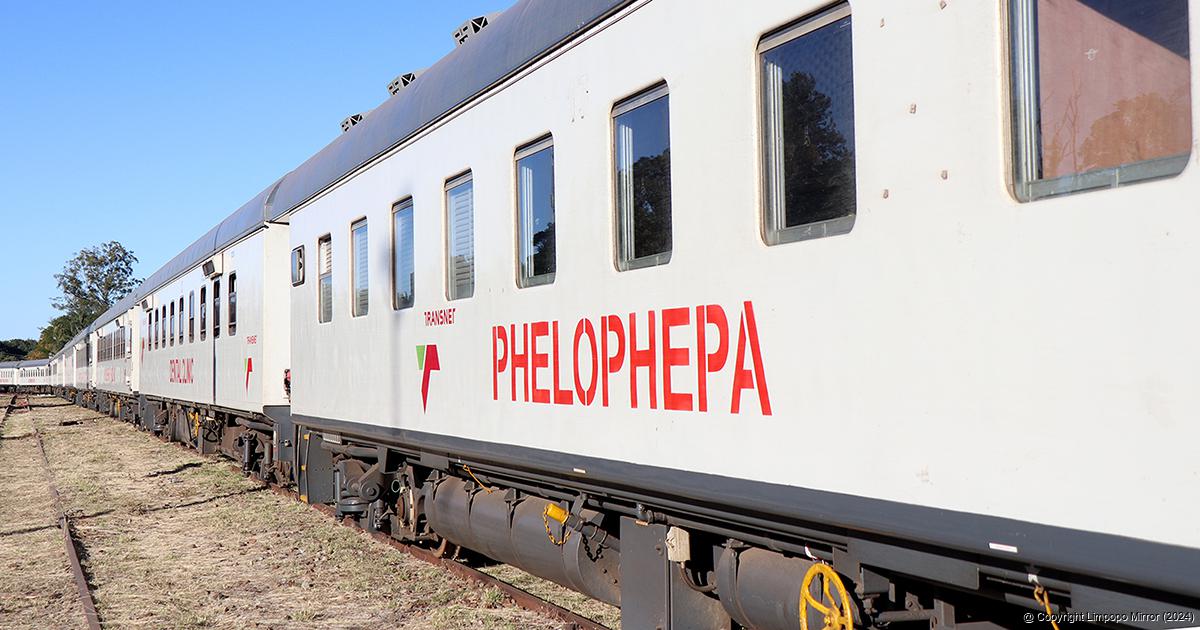

ADVERTISEMENT:

The Phelophepa Health Care Train’s ability to provide essential free medical services was hampered by a water shortage in Vhembe District, affecting its operations at the Louis Trichardt train station. Photo: Thembi Siaga.
'Waterless' Vhembe causes problems for Phelophepa Health Train
With the critical need for accessible healthcare, the Phelophepa Health Care Train made its way to Louis Trichardt train station, providing much-needed free medical care from Monday, 3 June to Friday, 14 June. However, the train faced a typical challenge: Vhembe’s water shortage.
Scores of residents from various nearby communities visited the train, which offered medical consultations, screenings, treatments, and health education at no cost. The train provides one-on-one, face-to-face counselling and psycho-educational workshops—two methods to assist patients in finding solutions to their health problems.
Operated by the Transnet Foundation, the Phelophepa Health Care Train aims to improve healthcare access for underserved populations across South Africa, particularly in rural and remote areas with limited healthcare facilities.
During its recent visit, residents eagerly awaited the train’s arrival, seeking medical assistance and health education. Some arrived well before the train opened, with some even spending the night, hoping to be among the first in line for the promised “good, clean health.” Mr Nikiwe Majoko, who needed an eye check and glasses, praised the train’s service despite the challenging long queues.
“I am happy with their service, but accessing it isn’t easy due to their daily patient limit. Some of us who live far away had to sleep on chairs at the station, hoping to be seen first the next day. They treated us well, and we hope they can visit more frequently as not everyone can afford to see doctors,” he said.
Sadly, the lack of water at the train station hampered the delivery of services. Access to clean water is crucial for the train’s medical services, including hygiene practices and sanitation standards. Bheki Mdlula, the train manager, explained how the water shortage affected the train’s operations.
“The challenges we faced stemmed from our stakeholder, the Vhembe District Municipality (VDM), which couldn’t provide us with water. We hope this issue is resolved before our next visit, as this is a flagship programme. We urge all stakeholders to collaborate to ensure its success. Unfortunately, water challenges persisted,” Mdlula said.
According to Mdlula, they had to rent tanks and source water to continue operations. “Despite this, everything else ran smoothly,” he said.
The spokesperson for the VDM, Mr Matodzi Ralushai, responded by saying that he was not aware of any water shortage at the station. “We also did not receive a formal request for water from the Phelophepa Health Care Train to supply them with water tanks,” Ralushai said.
Date:27 June 2024
By: Thembi Siaga
Thembi Siaga started as an intern during 2021. He assisted with video photography and editing. He also produced numerous small documentaries, focusing on the Vhembe region and its people. Currently he works as a freelance journalist, covering stories in the Elim area.
Thembi studied at the Tshwane University of Technology, where he completed his diploma in Journalism in 2021.
Read: 1902

ADVERTISEMENT

ADVERTISEMENT:

ADVERTISEMENT:

Recent Articles
-

Mutendas shows consistency on new album
30 June 2024 By Elmon Tshikhudo -

Dr Mercy is the new face at Univen FM
30 June 2024 By Elmon Tshikhudo -

-

2kan RSA's music mends all these broken hearts
29 June 2024 By Elmon Tshikhudo -

Young Avhaandi tries to give hope to the youth
29 June 2024 By Elmon Tshikhudo

ADVERTISEMENT

Popular Articles
-

Where do Limpopo's residents move to?
16 June 2024 By Anton van Zyl -

IK practitioners in Limpopo get their appointment letters
12 May 2024 By Elmon Tshikhudo -

Philanthropist Collins Mashawana honoured with doctorate degree
04 May 2024 By Maanda Bele -

Icon in Vhembe's education circles, Dr Gerson Rambiyana bids farewell
04 May 2024 By Silas Nduvheni -

'Vampire' who attacks old lady killed by angry mob
07 June 2024 By Maanda Bele -

Yes, Mia Muofhe was murdered
10 May 2024 By Elmon Tshikhudo -

Univen student to represent SA in Germany
22 June 2024 By Thembi Siaga

